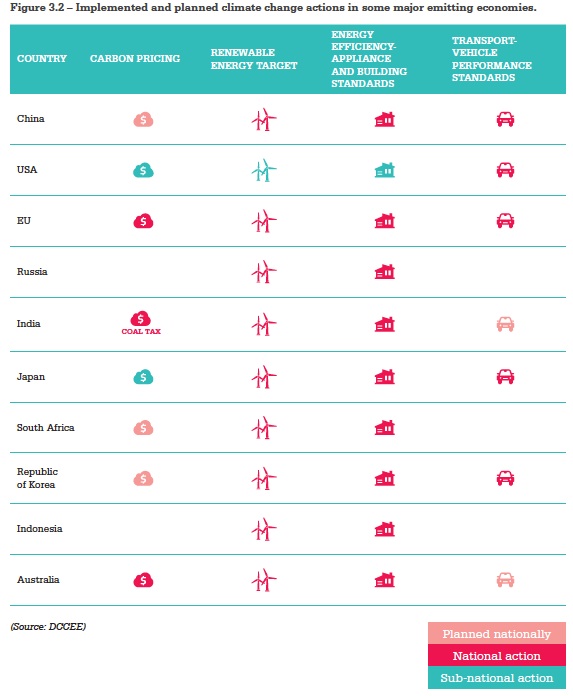Mexican Climate Legislation and Other Hopeful News
Posted on 30 December 2012 by dana1981
In the wake of a lot of bad climate-related news, like the lack of progress at the Doha international climate conference, the World Bank Report finding that we're on track for 4°C global surface warming by 2100 and PricewaterhouseCoopers suggesting we may be headed for 6°C, both of these scenarios spelling climate catastrophe, it may be useful to look at some good news to keep a ray of climate hope alive.
For example, in an important bit of news which somewhat flew under the radar, Mexico passed comprehensive climate legislation in April 2012. Some important components of the bill include:
-
A mandate to reduce emissions of carbon dioxide by 30% below business-as-usual levels by 2020, and by 50% below 2000 levels by 2050.
-
A stipulation that 35% of the country's electricity should come from renewable sources by 2024.
-
Mandatory emissions reporting by the country's largest polluters.
-
Establishment of a climate change commission to oversee implementation of the bill.
-
Encouragement to develop a carbon-trading scheme.
The legislation passed with bipartisan support, with a vote of 128-10 in the lower house, and unanimous support in the Mexican Senate (78-0), putting the political climate partisanship in the USA to shame.
Mexico in Good Company
This passage makes Mexico the second world nation to implement global warming legislation, along with the United Kingdom. Some other climate-related legislation around the world includes:
-
-
-
-
Australia's carbon pricing system, which the country plans to link to the EU emissions trading system in 2018.
-
South Korea's carbon trading system, which like Mexico's was passed with broad bipartisan support earlier this year.
-
California's new cap and trade system, which just recently had its first carbon credit auction.
-
Québec is also implementing a carbon cap and trade system beginning in 2013.
-
The Regional Greenhouse Gas Initiative in 9 northeastern United States.
-
-
-
China's first steps to create its own carbon emissions trading system including trial carbon cap and trade systems in a few provinces and cities.
-
South Africa's planned carbon tax, to begin in 2013.
-
Japan's planned carbon tax, to be phased in between 2013 and 2016.
-
Ireland's carbon tax - an example of many European countries with carbon taxes.
The Australian Climate Commission summarized some of these actions in a new report about International Action on Climate Change.
Implemented and planned climate change actions in some major emitting economies. Blue represents a sub-national action, pink represents a planned national action, and red represents an implemented national action.
So the good news is that while we have failed to reach an international agreement following the expiration of the Kyoto Protocol, quite a few nations are nevertheless taking action into their own hands to reduce greenhouse gas emissions and mitigate climate change. And where national action has thus far failed (as in the USA and Canada), some local governments are stepping up and implementing their own climate mitigation policies.
Thus there is still reason for hope that we can at least avoid catastrophic climate change, and with enough continued climate mitigation momentum, we might still be able to avoid surpassing the 2°C 'danger limit'. As Michael Mann noted,
"It is still possible to avoid 2-degree warming, and arguing it is too late could very easily be a self-fulfilling prophecy. That having been said, the real issue is whether or not we have the political will."
The political will exists in the countries and localities listed above. Now we need to keep expanding the will, demanding that the USA follow California's example, that Canada follow British Colubia and Québec's example, and that nations worldwide arrive at a new agreement to replace the Kyoto Protocol. Although we're running out of time, it's not yet too late to avert a climate crisis. As Al Gore recently agued,
"Changes like this [climate policy] don’t occur in a linear way. The potential for change builds up, unmanifested, until it reaches a critical mass. You don’t always see it coming. There are plenty of examples of that. I believe we’re seeing just that kind of movement just beneath the surface here in the U.S....I’m not saying we’re right on the tipping point. I know better than that. But neither do I think it’s accurate to say that we’re stuck in neutral....a lot of countries around the world are looking at their hold cards, they’re looking at the damage, and it is now translating into a set of commitments that are meaningful and will continue."































 Arguments
Arguments
























 0
0  0
0






Comments